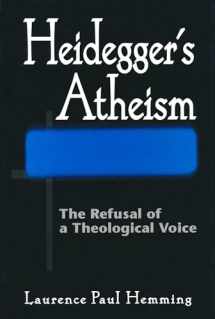
Heidegger’s Atheism: The Refusal of a Theological Voice
ISBN-13:
9780268030582
ISBN-10:
0268030588
Edition:
First Edition
Author:
Laurence Paul Hemming
Publication date:
2002
Publisher:
University of Notre Dame Press
Format:
Hardcover
342 pages
Category:
Christian Books & Bibles
,
Modern
,
Philosophy
,
Religious
FREE US shipping
Book details
ISBN-13:
9780268030582
ISBN-10:
0268030588
Edition:
First Edition
Author:
Laurence Paul Hemming
Publication date:
2002
Publisher:
University of Notre Dame Press
Format:
Hardcover
342 pages
Category:
Christian Books & Bibles
,
Modern
,
Philosophy
,
Religious
Summary
Heidegger’s Atheism: The Refusal of a Theological Voice (ISBN-13: 9780268030582 and ISBN-10: 0268030588), written by authors
Laurence Paul Hemming, was published by University of Notre Dame Press in 2002.
With an overall rating of 3.5 stars, it's a notable title among other
Christian Books & Bibles
(Modern, Philosophy, Religious) books. You can easily purchase or rent Heidegger’s Atheism: The Refusal of a Theological Voice (Hardcover) from BooksRun,
along with many other new and used
Christian Books & Bibles
books
and textbooks.
And, if you're looking to sell your copy, our current buyback offer is $0.3.
Description
Heidegger’s Atheism explains what Heidegger meant when he said that all philosophy is atheistic. This unique book traces the development of his explanation of philosophy as a methodological atheism, and relates it to his reading of Aristotle, Aquinas, and Nietzsche. A predominant issue throughout this study is Heidegger’s pursuit of an answer to the question: How did God get into philosophy?
Laurence Paul Hemming discusses a wide range of topics in this comprehensive volume, including the influence of Heidegger on theologians like Bultmann, Rahner, and Ott; the central themes of Being and Time; Heidegger’s political decisions and involvement with National Socialism; and Jean-Luc Marion’s reading of Heidegger. Hemming also provides an in-depth analysis of Heidegger’s turn or Kehre. He addresses how Heidegger’s understanding of das Ereignis, the event, relates both to his view of atheism and to the way he appropriated Nietzsche’s proclamation of the death of God.
Heidegger’s Atheism also attempts to trace new possibilities in the relationship between theology and philosophy in Heidegger’s critique of metaphysics. Hemming argues that Heidegger criticizes the tradition of metaphysics from Aristotle and Plato through Nietzsche and Hegel because it traces a particular understanding of being in relation to God―even when that God is announced as dead. In contrast, Heidegger sees the task of philosophy as the self-understanding of human existence, and claims philosophy offers no definitives regarding what God humanity might encounter. Consequently, Hemming argues, Heidegger’s atheism is an implicit critique of theology. Yet, Hemming also contends Heidegger’s work resonates with the concerns of Christian faith, especially the Catholic tradition.
Heidegger’s Atheism offers radical and challenging conclusions about most of the recent British and American readings of Heidegger. Sure to provoke much debate and discussion, Heidegger’s Atheism is essential for anyone with an interest in Heidegger.
Laurence Paul Hemming discusses a wide range of topics in this comprehensive volume, including the influence of Heidegger on theologians like Bultmann, Rahner, and Ott; the central themes of Being and Time; Heidegger’s political decisions and involvement with National Socialism; and Jean-Luc Marion’s reading of Heidegger. Hemming also provides an in-depth analysis of Heidegger’s turn or Kehre. He addresses how Heidegger’s understanding of das Ereignis, the event, relates both to his view of atheism and to the way he appropriated Nietzsche’s proclamation of the death of God.
Heidegger’s Atheism also attempts to trace new possibilities in the relationship between theology and philosophy in Heidegger’s critique of metaphysics. Hemming argues that Heidegger criticizes the tradition of metaphysics from Aristotle and Plato through Nietzsche and Hegel because it traces a particular understanding of being in relation to God―even when that God is announced as dead. In contrast, Heidegger sees the task of philosophy as the self-understanding of human existence, and claims philosophy offers no definitives regarding what God humanity might encounter. Consequently, Hemming argues, Heidegger’s atheism is an implicit critique of theology. Yet, Hemming also contends Heidegger’s work resonates with the concerns of Christian faith, especially the Catholic tradition.
Heidegger’s Atheism offers radical and challenging conclusions about most of the recent British and American readings of Heidegger. Sure to provoke much debate and discussion, Heidegger’s Atheism is essential for anyone with an interest in Heidegger.


We would LOVE it if you could help us and other readers by reviewing the book
Book review

Congratulations! We have received your book review.
{user}
{createdAt}
by {truncated_author}


